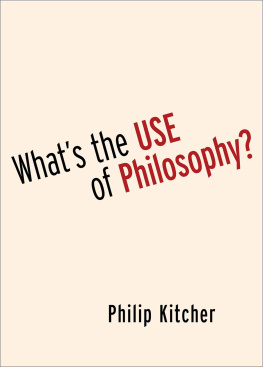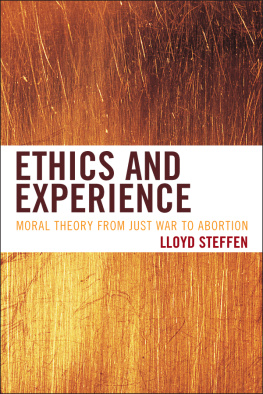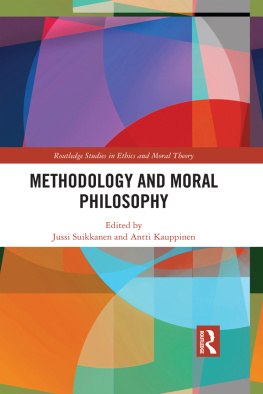Moral Progress
THE MUNICH LECTURES IN ETHICS
The Munich Lectures in Ethics series presents biennial lectures delivered by prominent philosophers at the Ludwig Maximilian University (LMU) in order to make their ideas accessible to a wider audience. The lectures are hosted by the Munich Center for Ethics, and they are edited as a series by Monika Betzler, who holds the Chair for Practical Philosophy and Ethics at LMU.
VOLUMES PUBLISHED IN THE SERIES
Philip Kitcher, Moral Progress
With Commentaries by Amia Srinivasan, Susan Neiman, and Rahel Jaeggi
Edited and Introduced by Jan-Christoph Heilinger

Oxford University Press is a department of the University of Oxford. It furthers the Universitys objective of excellence in research, scholarship, and education by publishing worldwide. Oxford is a registered trade mark of Oxford University Press in the UK and certain other countries.
Published in the United States of America by Oxford University Press
198 Madison Avenue, New York, NY 10016, United States of America.
Oxford University Press 2021
All rights reserved. No part of this publication may be reproduced, stored in a retrieval system, or transmitted, in any form or by any means, without the prior permission in writing of Oxford University Press, or as expressly permitted by law, by license, or under terms agreed with the appropriate reproduction rights organization. Inquiries concerning reproduction outside the scope of the above should be sent to the Rights Department, Oxford University Press, at the address above.
You must not circulate this work in any other form and you must impose this same condition on any acquirer.
Library of Congress Cataloging-in-Publication Data
Names: Kitcher, Philip, 1947 author. | Heilinger, Jan-Christoph, editor.
Title: Moral progress / Philip Kitcher ; with commentaries by Amia Srinivasan,
Susan Neiman, Rahel Jaeggi ; edited and introduced by Jan-Christoph Heilinger.
Description: New York : Oxford University Press, 2021. |
Series: Munich lectures in ethics | Includes bibliographical references and index.
Identifiers: LCCN 2020055362 (print) | LCCN 2020055363 (ebook) |
ISBN 9780197549155 (hb) | ISBN 9780197549179 (epub)
Subjects: LCSH: Ethics, Evolutionary. | EthicsMethodology. | Pragmatism.
Classification: LCC BJ1311 .K535 2021 (print) | LCC BJ1311 (ebook) |
DDC 171/.7dc23
LC record available at https://lccn.loc.gov/2020055362
LC ebook record available at https://lccn.loc.gov/2020055363
DOI: 10.1093/oso/9780197549155.001.0001
For Leo and Eva
with love
Contents
Jan-Christoph Heilinger
Philip Kitcher
Amia Srinivasan
Susan Neiman
Rahel Jaeggi
Philip Kitcher
With the arrival of tens of thousands of refugees at Munich Central Station in the late summer of 2015, Munich found itself at the heart of one of the most profound challenges facing society today. The issue of migration was suddenly no longer remote and distant: answers to practical and often ethically complex questions were urgently needed. Of course, migration is just one of many challenges that this German city and the world are facing: climate change; the Covid-19 pandemic; digitalization and its impact on how we work, communicate, and lead relationships; and the development of CRISPRCas9 genome editing are no less pressing problems which require ethical reflection. Apart from such societal and technological changes, there are also many further ethical questions that confront us in our everyday lives. Is there such a thing as moral progress? Are human rights enough to address social and economic inequality? How can we capture and confront new societal injustices? What do we owe those with whom we have a close relationship? How can we provide ethical guidance on the area of aging? Can we go too far in the name of morality?
The aim of the Munich Lectures in Ethics is to address these morally relevant and pressing challenges, to advance our understanding of them, and to offer philosophically informed reflections and possible solutions to these issues. These lectures are held at the Munich Center for Ethics and Practical Philosophy, an interdisciplinary research center under the auspices of the Faculty of Philosophy of Ludwig Maximilian University (LMU) of Munich, the main goals of which are to enhance research in ethics and public debate on morally relevant themes and to foster collaboration with other subjects, most notably the sciences, medicine, business, and law. They thus contribute to creating a responsible research environment: they encourage individuals to be responsible actors and to work toward creating a more sustainable world. Located at LMU, one of Europes leading academic and research institutions, the Munich Center for Ethics and Practical Philosophy is ideally placed to host the Munich Lectures, thereby helping to promote public debate on ethical themes of general interest and attracting the attention of a wide audience interested in ethically informed answers to the problems facing society today.
Inaugurated in 2019, the Munich Lectures in Ethics is a biennial lecture series, which takes place over the course of three days. Each of the lectures is followed by a comment given by a distinguished philosopher. The first lectures, which are published in this series, were delivered by Philip Kitcher, John Dewey Professor Emeritus of Philosophy at Columbia University, from June 5 to June 7, 2019, on the topic of Moral Progress. Professor Rahel Jaeggi of the Humboldt University of Berlin; Dr. Susan Neiman, director of the Einstein Forum, Potsdam; and Professor Amia Srinivasan of St Johns College, University of Oxford, commented on the lectures.
As the spokesperson of the Munich Center for Ethics and Practical Philosophy and as one of the initiators of the Munich Lectures in Ethics, I am extremely grateful to Philip Kitcher for having presented the first Munich Lectures in Ethics.
I am also indebted to Oxford University Press for having agreed to publish the Munich Lectures in Ethics as a series. These publications will make the lectures available to a broader international readership, thus giving philosophical scholarship the opportunity to influence matters of practical importance and provide much-needed orientation. I owe an enormous debt of gratitude to Peter Ohlin for his diligence and help with editing this series.
Monika Betzler
Ludwig Maximilian University of Munich
Nearly a decade ago, in Preludes to Pragmatism, I expressed the hope that I should one day be able to provide a more systematic treatment of the pragmatist themes presented in that collection. As so often in philosophical explorations, eventual outcomes dont correspond exactly to anticipations. The present volume begins a partial fulfillment of my tentative promise. It will be the first of a trilogy, attempting to offer a more synthetic and unified account of ideas scattered among my earlier essays. Although each book is free-standing, they are intended to combine in developing a twenty-first-century version of Deweyan pragmatism.
Dewey insisted, throughout his mature writings, on the need for each generation to rethink the philosophical agenda in light of the circumstances of the age. I follow him in this. Hence this book, and its two successors, will attempt to reorient philosophical discussion by modifying the questions taken to be central. Central to philosophy, as I see it, is the concept of human progress. Like Dewey, I recognize the difficulties of that conceptand of making genuine progresswhile emphasizing its importance. At the core of our shared vision is a sense of human lives and societies, extended over hundreds of thousands of years, in which each generation strives to improve the world it will bequeath to its successors. Nothing in Deweys writings is more eloquent than the close of














